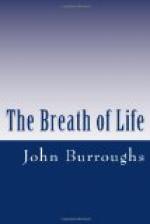of the spirit of the tree? If the laws of matter
and force alone account for the living organism, if
we do not have to think of something that organizes,
then how do we account for the marvelous diversity
of living forms, and their still more marvelous power
of adaptation to changed conditions, since the laws
of matter and force are the same everywhere?
Science can deal only with the mechanism and chemistry
of life, not with its essence; that which sets up
the new activity in matter that we call vital is beyond
its analysis. It is hard to believe that we have
told the whole truth about a living body when we have
enumerated all its chemical and mechanical activities.
It is by such enumeration that we describe a watch,
or a steam-engine, or any other piece of machinery.
Describe I say, but such description does not account
for the watch or tell us its full significance.
To do this, we must include the watchmaker, and the
world of mind and ideas amid which he lives. Now,
in a living machine, the machine and the maker are
one. The watch is perpetually self-wound and
self-regulated and self-repaired. It is made
up of millions of other little watches, the cells,
all working together for one common end and ticking
out the seconds and minutes of life with unfailing
regularity. Unlike the watch we carry in our pockets,
if we take it apart so as to stop its ticking, it
can never be put together again. It has not merely
stopped; it is dead.
The late William Keith Brooks, of Johns Hopkins University,
said in opposition to Huxley that he held to the “old-fashioned
conviction that living things do in some way, and
in some degree, control or condition inorganic nature;
that they hold their own by setting the mechanical
properties of matter in opposition to each other, and
that this is their most notable and distinctive characteristic.”
And yet, he said, to think of the living world as
“anything but natural” is impossible.
VIII
Life seems to beget a new kind of chemistry, the same
elements behave so differently when they are drawn
into the life circuit from what they did before.
Carbon, for instance, enters into hundreds of new compounds
in the organic world that are unknown in the inorganic
world. I am thus speaking of life as if it were
something, some force or agent, that antedates its
material manifestations, whereas in the eyes of science
there is no separation of the one from the other.
In an explosion there is usually something anterior
to, or apart from, the explosive compound, that pulls
the trigger, or touches the match, or completes the
circuit, but in the slow and gentle explosions that
keep the life machinery going, we cannot make such
a distinction. The spark and the powder are one;
the gun primes and fires itself; the battery is perpetually
self-charged; the lamp is self-trimmed and self-lit.




